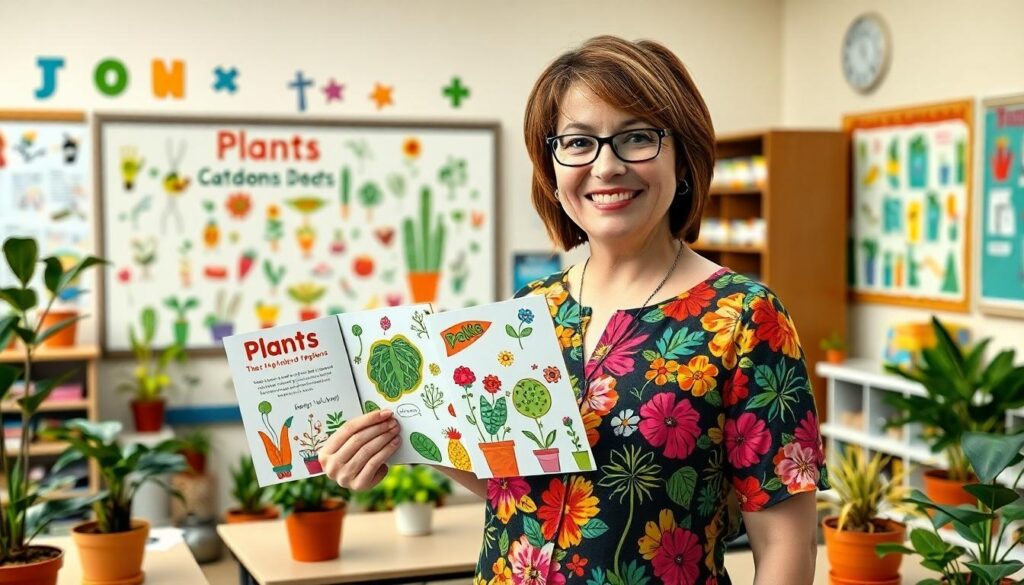Looking for a way to brighten up your classroom? We’ve cultivated the perfect collection of school-appropriate plant jokes that’ll have your students and colleagues giggling without crossing any lines. These pun-derful botanical quips are educational, clean, and guaranteed to grow smiles.
10 Wholesome Plant Jokes That Will Grow on Your Students
- Why don’t trees ever feel lonely? Because they’re always rooted in great friendships! Trees form complex underground networks with fungi called mycorrhizal networks that allow them to communicate and share resources.
- What did the plant say to the gardener? Thanks for helping me grow, I’m rooting for you! Plants actually respond positively to human interaction, with studies showing some plants grow better when spoken to regularly.
- How do you know when a plant is math-smart? It has square roots! This joke works wonderfully when teaching both biology and mathematics concepts simultaneously.
- What’s a plant’s favorite subject in school? Stem class! This clever pun refers to both plant biology and STEM education (Science, Technology, Engineering, and Mathematics).
- Why was the gardener so patient with the seeds? Good things come to those who plant! Gardening teaches valuable lessons about patience and perseverance that students can apply to their own lives.
- What do you call a plant that sings? A bloom-box! Music and plant growth have interesting connections, with some research suggesting that plants respond differently to various types of music.
- What did the leaf say to autumn? I’m falling for you! This seasonal joke helps students remember the natural cycles of deciduous trees and the process of abscission.
- Why couldn’t the flower ride a bike? It lost its petals! This simple joke helps reinforce flower anatomy lessons while providing a light-hearted moment.
- What’s a tree’s least favorite month? Sep-timber! This joke can be used when discussing forestry, conservation, or environmental science topics.
- How do seeds get around the garden? They take the shortest root! This pun reinforces understanding of plant structures while demonstrating how roots grow toward water and nutrients.
Why Plant Humor Belongs in the Classroom

Plant-themed humor offers a powerful educational tool that connects scientific concepts to relatable, light-hearted content. These clever jokes and puns create memorable learning experiences while reinforcing important botanical terminology.
Educational Benefits of Using Humor
Humor significantly aids knowledge retention by linking abstract concepts to tangible jokes. When students encounter plant-based wordplay like “Why did the flower take a science class? To learn about photosynthesis!” they’re more likely to remember the scientific process. Studies show that this approach helps students grasp complex botanical concepts more effectively by creating mental connections through laughter. Plant jokes also encourage critical thinking as students decode clever wordplay, such as “What do you call a plant that loves chemistry? A ‘chemical bloom’!” The cognitive process of understanding these jokes reinforces both language skills and scientific knowledge simultaneously.
Creating a Positive Learning Environment
Plant jokes serve as excellent icebreakers in the classroom, fostering inclusivity and community. Questions like “What did the plant say to the teacher? ‘You really help me grow!'” break down barriers between students and educators. The shared laughter from these jokes reduces anxiety and promotes a growth mindset, particularly beneficial for STEM subjects that some students find intimidating. Teachers who incorporate plant humor report improved student morale and participation, as humor naturally reduces stress and creates a comfortable space where questions are welcomed. This positive atmosphere encourages collaboration, with research confirming that classrooms prioritizing appropriate humor see stronger student-teacher relationships and increased engagement in learning activities.
Leaf-Worthy Puns for Science Class

Looking for some plant puns to brighten up your science classroom? These leafy jokes are perfect for biology lessons or just to add some humor to your school day.
- What political party do plants vote for?
- The Green Party.
- Why did the tree go to the dentist?
- To get its root canal done.
- Why was the plant sneaking about?
- To do an ambush.
- What did the tree say to encourage his friend?
- I’m rooting for you!
- Why did the sunflower go to the party?
- Because it was a blooming good time.
- What do you call a male flower?
- Peonies.
- Why do plants love DJ farmers?
- Because they drop the best beet in town.
Photosynthesis Funnies
- Why did photosynthesis go to therapy?
- It was feeling a little “disconnected” from sunlight.
- What did the sun say to photosynthesis?
- You’re “en-light-ening.”
- What’s a plant’s favorite subject in school?
- Chlorophyll-osophy.
Root System Riddles
- Why did the root go to the party?
- Because it was a “groundbreaking” event.
- What did the root say when it got tangled?
- I’m in a bit of a “twist.”
- How do roots communicate underground?
- They use their plant network.
Blooming Good One-Liners About Flowers

Plants can be the perfect subject for clean, classroom-friendly humor. Here are some flowery jokes that will have your students giggling while learning about plant biology.
Rose and Daisy Jokes
Roses and daisies provide excellent material for botanical humor that’s perfect for the classroom. “What did the plant say to his Valentine? You’re my soil-mate!” This joke connects relationships to the importance of soil in plant growth, making it both funny and educational. Students can use this type of wordplay to remember that plants depend on soil for nutrients and support. Another classroom favorite asks, “What did one flower say to the other flower on Valentine’s Day?” allowing teachers to customize the punchline based on the age group and learning objectives.
Sunflower Silliness
Sunflowers inspire some of the most delightful plant-based jokes for school settings. “Why did the sunflower always carry a backpack? It was ready for a field trip!” This clever joke combines the natural habitat of sunflowers with school activities, creating a memorable connection for students learning about plant habitats. Another popular sunflower quip asks, “What did the plant say when it was surprised? Leaf me alone!” This play on words helps students remember plant parts while enjoying a good laugh. Sunflower jokes work particularly well when teaching students about heliotropism – the way these flowers follow the sun throughout the day.
Tree-mendous Jokes for Arbor Day
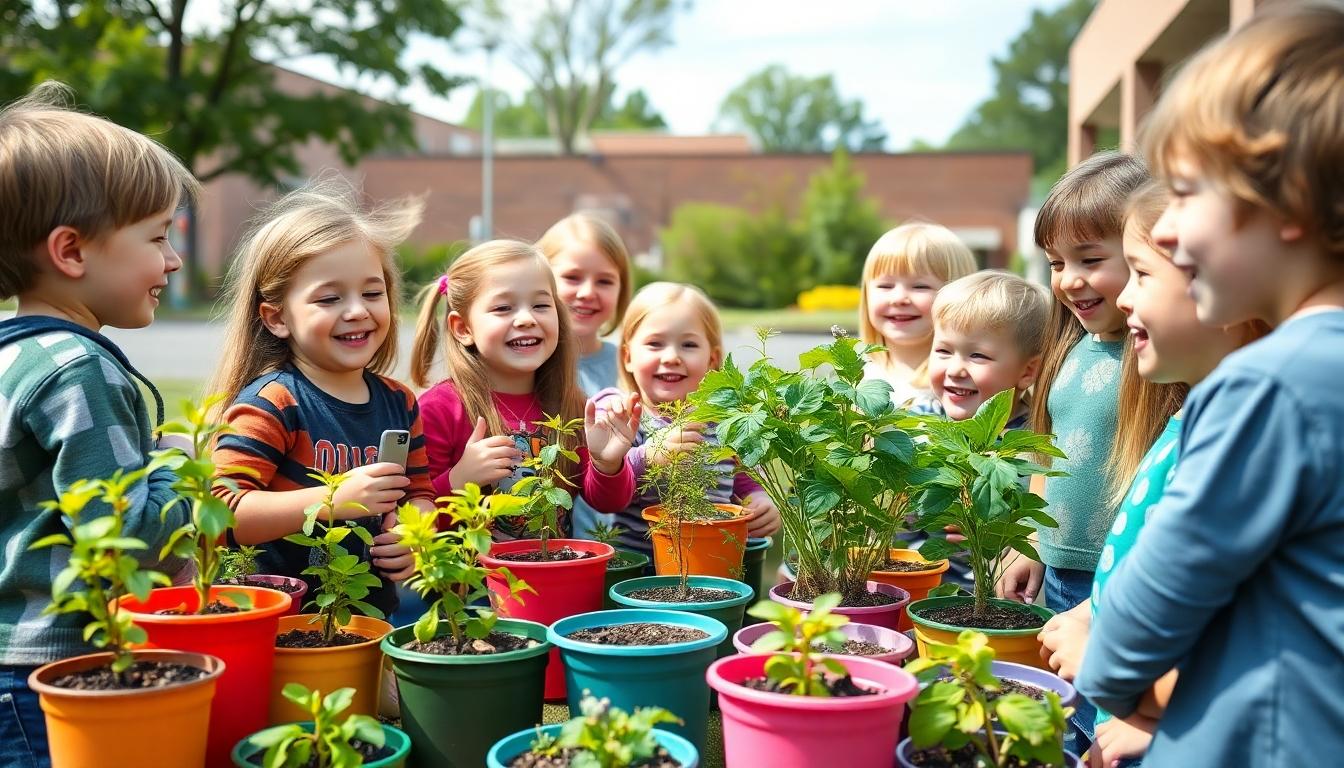
Arbor Day celebrations become even more enjoyable with these school-appropriate plant jokes that will have your students giggling while learning about trees and plants.
Evergreen Humor
Evergreen jokes stay funny all year round, just like the trees stay green! Our favorite evergreen humor includes jokes that connect gardening with everyday concepts. For instance, “Why did the gardener plant light bulbs? She wanted to grow a power plant!” This clever wordplay introduces students to different types of plants while making them laugh. Plants are also known for their calm demeanor, which leads to the joke: “Why was the plant always calm? It knew how to stay rooted!” This pun reinforces the importance of root systems while providing a lighthearted moment in your science lesson.
Deciduous Tree Quips
Deciduous trees, known for shedding their leaves, provide perfect material for seasonal humor. “What did the plant say when it was surprised? Leaf me alone!” This joke cleverly incorporates leaf terminology while demonstrating how plants can be personified in humorous ways. Plants also make great party guests according to another popular joke: “Why do plants always get invited to parties? Because they know how to leaf the fun!” These quips help students remember the characteristics of deciduous trees through memorable wordplay.
Beyond these categories, students might enjoy hearing why a plant broke up with its partner (it needed space to grow), or why a plant applied for a job (it wanted to make some “green”). For a more wholesome approach, share the joke about what a flower says to its friend: “I’m so glad we can grow together!” These plant-based jokes create an captivating atmosphere for learning about botany while celebrating Arbor Day.
Veggie Tales: Garden Produce Jokes

Looking to add some garden-fresh humor to your classroom? These vegetable jokes are perfect for sprouting smiles while teaching kids about produce and plant biology.
Tomato and Potato Punchlines
Tomatoes and potatoes are staples in both gardens and joke collections. “Why did the tomato turn red? It saw the salad dressing!” This classic joke connects color changes to emotions, making it perfect for discussing plant pigmentation with students. Family-themed humor works well too, as in “What did the mama tomato say to her daughter? Ketchup!” which playfully illustrates the concept of staying together in groups.
Potatoes offer fertile ground for wordplay that students love. “What day do potatoes hate? Fry-day!” This joke combines calendar awareness with food preparation methods, creating an instant classroom favorite. For mystery-loving students, try this riddle: “You throw away my outside, cook my inside, then eat my outside… What am I? Corn!” This brain teaser encourages critical thinking about plant parts and food processing.
Leafy Green Laughs
Lettuce-based jokes provide crisp opportunities for botanical humor. “What’s a lettuce’s favorite workout? Head rolls!” This pun works especially well when teaching about different lettuce varieties and their physical characteristics. For active classrooms, “What did the DJ say? Lettuce turnip the beet!” combines three vegetables in one groovy joke that gets kids moving.
Other leafy favorites include onion jokes that bring a tear to your eye: “If you take off my skin, I won’t cry, but you will. What am I? An onion!” This clever riddle introduces students to plant layers and chemical compounds. For a speed-themed laugh, ask “What’s the fastest vegetable? A runner bean!” which connects plant names with their physical characteristics in a memorable way. Cabbage jokes drive home the fun too: “What’s a taxi driver’s favorite vegetable? CABbage!” – perfectly illustrating how wordplay can make botanical terms stick with students.
Seed and Growth Jokes for Biology Lessons
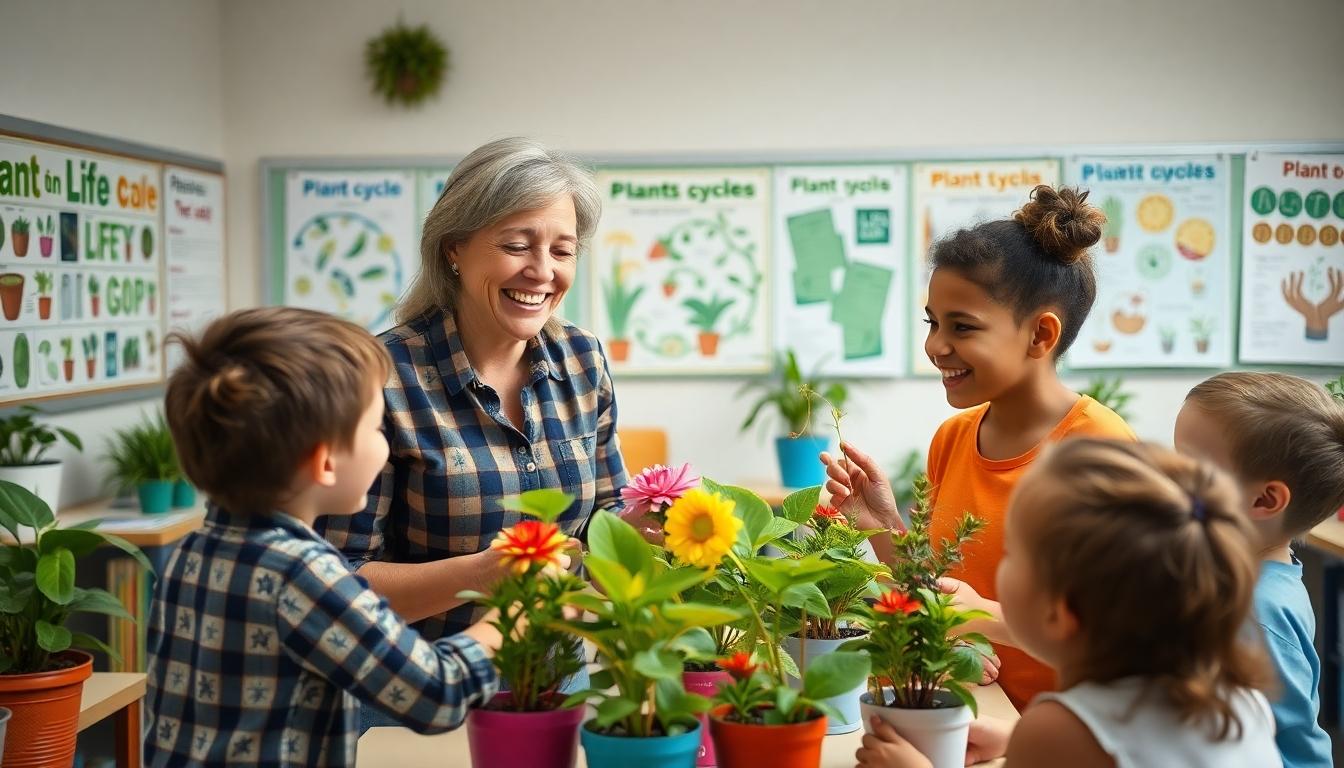
Looking to sprout some laughter in your biology classroom? These plant-themed jokes perfectly blend humor with educational concepts about seeds and growth.
Life Cycle Laughs
Plants make excellent scientists according to one popular joke: “Why do plants make great scientists? They have the right roots!” This clever pun connects scientific aptitude with plant structure. Students will also enjoy learning why flowers excel in science labs – “Because they know how to bloom in the lab!” Encouraging collaboration in experiments becomes more fun with the joke “What did the plant say to the experiment? Let’s grow together!” For teachers covering advanced topics like plant reproduction, the joke “How do you clone a plant? With stem cells” introduces complex concepts through accessible humor. These witty quips help reinforce key biological principles while keeping students engaged during lessons about plant life cycles.
Germination Giggles
Root-related humor works wonderfully when teaching about germination processes. “Why did the tree go to the dentist? For a root canal” connects plant anatomy to something students can relate to. Political science meets botany with the popular joke “What political party do plants vote for? The Green Party.” When discussing cellular biology, students laugh at “Why don’t plant cells win races? They’re always rooted to the spot” – a perfect way to remember the stationary nature of plant cells. Floral humor also thrives with jokes like “What did the husband say with wrong flowers? Whoopsie… Daisy!” These germination giggles provide excellent icebreakers for lessons about seed development and early plant growth stages. Educational plant humor that incorporates botany concepts, such as “Why did algae marry fungus? They took a lichen to each other!” helps students remember symbiotic relationships while enjoying classroom-friendly comedy.
Cactus and Succulent Humor That’s Not Too Prickly
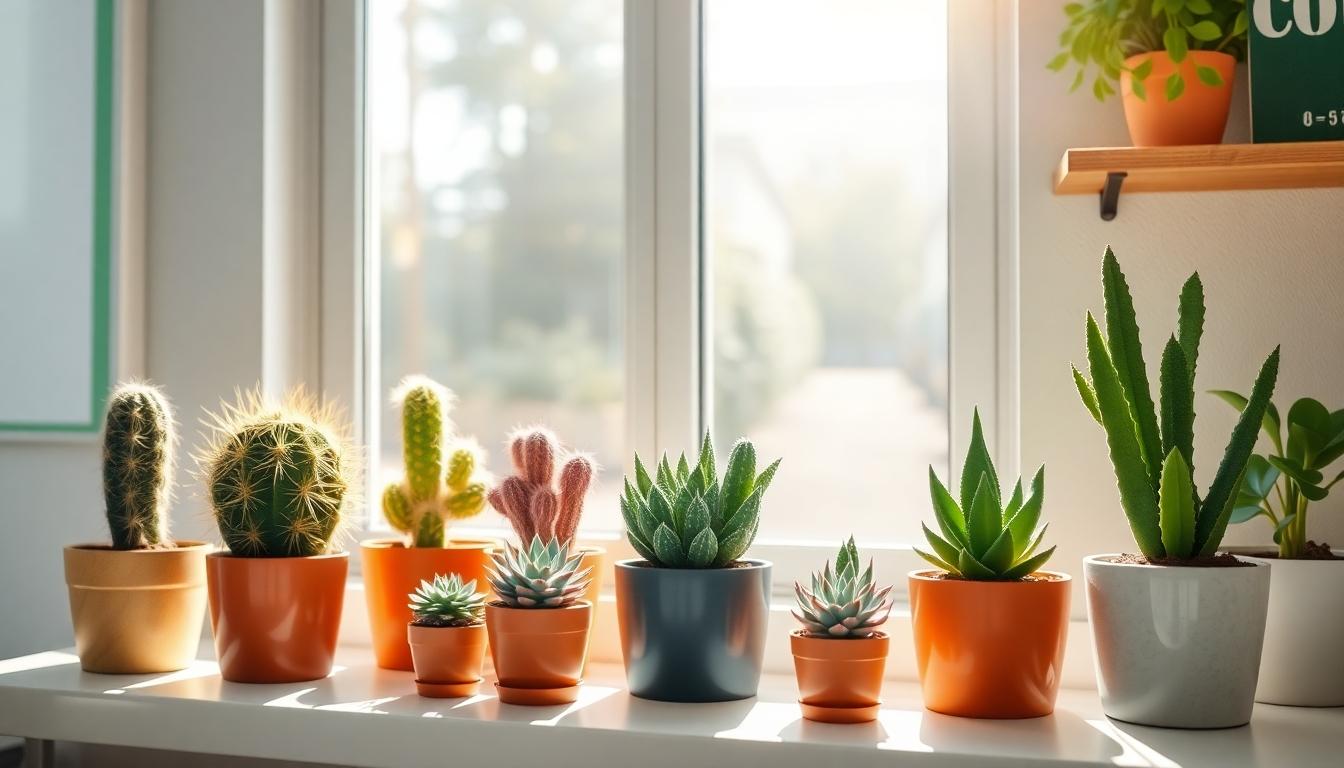
Succulent jokes deserve a special place in our plant humor collection, offering students a chance to learn about these water-storing wonders while enjoying some laughs. These unique plants with their distinctive appearances provide perfect material for classroom-friendly humor that won’t leave anyone feeling stuck.
Plants with playing card skills: Why do succulents love to play cards? They always have a “full house” of rosettes and interesting leaf arrangements!
Musical plant preferences: What’s a cactus’s favorite type of music? “Root” rock—they really dig those deep rhythms!
Space-loving vegetation: Why did the succulent break up with its partner? It genuinely needed space to grow and develop its unique shape!
Surprised plant reactions: What did the cactus say when it was startled in the classroom? “Leaf me alone!” even though not having traditional leaves like other plants.
Story-loving desert dwellers: What do you call a succulent that loves to tell stories during science class? A “tale-plant” that captivates everyone’s attention!
Musically ambitious cacti: Why did the cactus join the school band? It wanted to “branch out” and develop new skills beyond just standing in the windowsill!
Friendly plant connections: What might one succulent say to another on the first day of school? “I’m so glad we can grow together in this classroom environment!”
These jokes work wonderfully when introducing desert adaptations or water conservation in science lessons, creating memorable connections to these remarkable plants’ survival strategies.
Plant-Based Knock-Knock Jokes Kids Will Remember

Knock-knock jokes are classroom favorites that combine wordplay with the predictable format children love. We’ve cultivated a collection of plant-themed knock-knock jokes that will take root in your students’ memories and grow their appreciation for botanical humor.
Classic Plant Knock-Knock Jokes
- Knock, knock!
Who’s there?
Leaf.
Leaf who?
Leaf me alone, I’m growing tired! - Knock, knock!
Who’s there?
Fern.
Fern who?
Fern-tastic to meet you! - Knock, knock!
Who’s there?
Lily.
Lily who?
Lily every time I tell a plant joke!
Seasonal Plant Knock-Knock Jokes
- Knock, knock!
Who’s there?
Tulip.
Tulip who?
Tulips are better than one in the garden! - Knock, knock!
Who’s there?
Rose.
Rose who?
Rose are red, but some can be blue too! - Knock, knock!
Who’s there?
Bud.
Bud who?
Bud I thought you already knew this joke!
Tree-Based Knock-Knock Jokes
- Knock, knock!
Who’s there?
Willow.
Willow who?
Willow me to tell you another joke? - Knock, knock!
Who’s there?
Oak.
Oak who?
Oak-ay, let’s branch out to another topic! - Knock, knock!
Who’s there?
Pine.
Pine who?
Pine not, I’ll tell you another joke soon!
These knock-knock jokes create a perfect opportunity for students to create their own plant puns. Teachers can encourage creativity by having students develop original plant-themed knock-knock jokes, reinforcing both botanical vocabulary and wordplay skills. Each joke serves as a seed that can sprout into deeper discussions about different plant types, characteristics, and growth habits.
How to Use Plant Jokes in Educational Activities
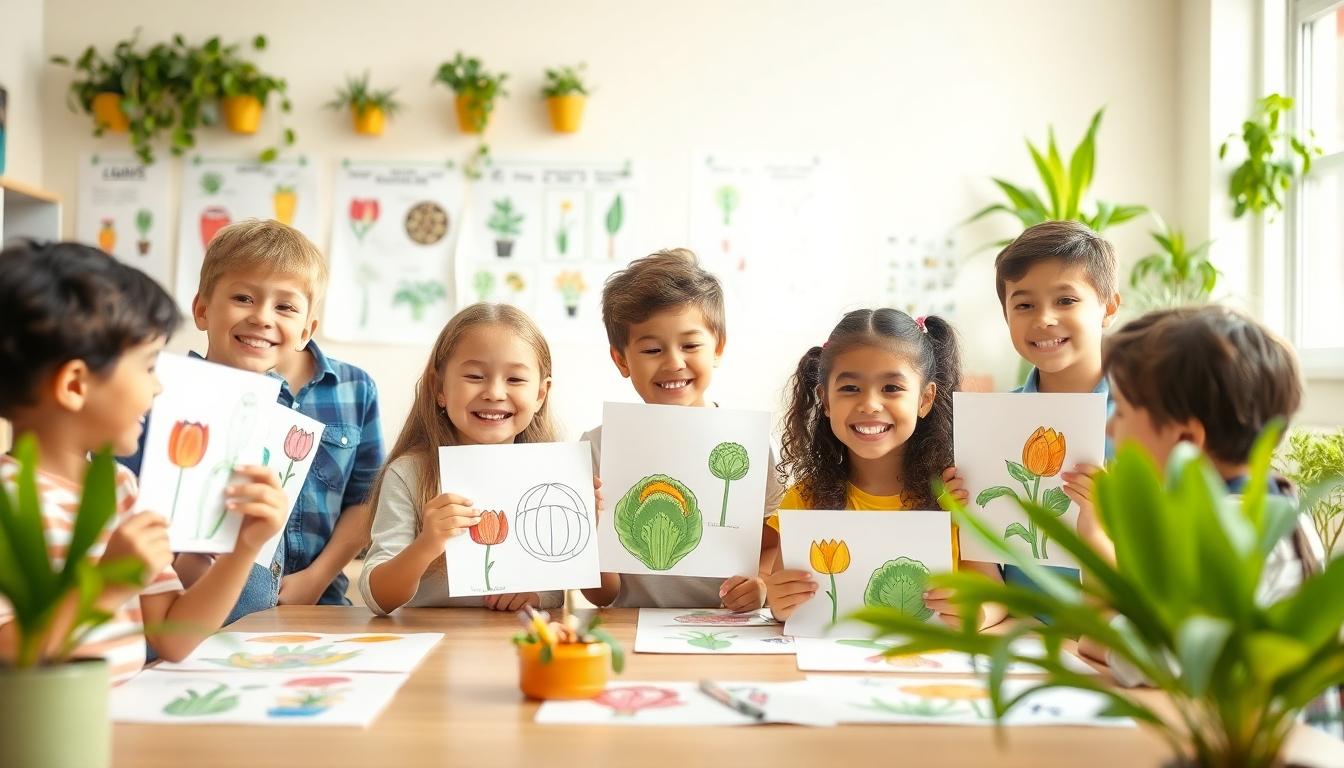
Science Lesson Integration
Plant jokes can effectively reinforce scientific concepts in the classroom. We’ve found that jokes like “Why did the tree need a nap? For rest” create perfect opportunities to discuss plant biology and root systems. Students tend to remember information better when it’s connected to humor, making complex topics like photosynthesis more accessible. Try introducing a relevant joke before starting a new plant science unit to capture attention and create a memorable anchor for the lesson.
Creative Writing Exercises
Encouraging students to compose their own pun-filled stories using plant vocabulary strengthens both scientific understanding and language skills. We recommend assigning creative writing prompts that incorporate terms like “chlorophyll,” “photosynthesis,” or “germination.” This activity challenges students to understand the scientific concepts well enough to create humor around them. Students can share their plant-based stories or joke books with classmates, reinforcing learning through peer engagement.
Memory-Improving Games
Creating matching games with plant jokes significantly improves term retention. We suggest developing flashcards that pair botanical terms with related jokes—for example, matching “tulips” with “What grows on your face?” These games work particularly well for younger students learning basic plant vocabulary or older students mastering more complex botanical terminology. The playful association helps cement scientific terms in long-term memory.
Artistic Plant Illustrations
Art projects that illustrate plant jokes reinforce understanding of plant anatomy and structures. Students can design posters or digital graphics depicting jokes like “Why shouldn’t you tell secrets on a farm? Potatoes have eyes, and corn has ears!” This cross-curricular approach connects visual learning with scientific concepts, making the parts of plants more memorable. Displaying these creations around the classroom creates a positive learning environment filled with scientific reminders.
Character Education Connections
Plant jokes offer surprising opportunities to discuss important character traits and social skills. We can use jokes like “Plants root for each other” to initiate conversations about teamwork and support. These moral lessons connect scientific concepts to social-emotional learning, creating well-rounded educational experiences. The Green Party joke (“What party do plants vote for?”) can even introduce discussions about environmental responsibility and citizenship.
Icebreaker Activities
Starting class with a plant joke creates an inviting atmosphere that reduces anxiety about science subjects. We recommend using jokes like “What did the cabbage win the race? Because it was a-head!” to break tension at the beginning of challenging lessons. This approach is particularly effective with students who feel intimidated by STEM subjects. Teachers report improved student morale and engagement when humor becomes a regular classroom feature.
Vocabulary Reinforcement
Plant jokes naturally incorporate key botanical terms, making them excellent vocabulary building tools. We suggest organizing jokes by theme—such as “encourage-mint” for herbs or “croak-us” for flowers—to reinforce exact vocabulary groups. This approach helps students naturally absorb scientific terminology through wordplay, creating stronger neural connections than rote memorization alone.
Conclusion: Planting Seeds of Humor in Education
These plant jokes do more than just make us laugh—they cultivate a love for learning that can grow throughout students’ educational journeys. By weaving humor into botanical lessons we’ve shown how something as simple as a pun can transform dry scientific concepts into memorable experiences.
From photosynthesis funnies to cactus quips these jokes create an environment where science becomes approachable and fun. They’re tools that help students retain information while developing critical thinking skills in a pressure-free setting.
So go ahead and sprinkle these plant jokes throughout your lessons. Watch as your classroom blooms with engagement laughter and deeper understanding. When we plant these seeds of humor the educational harvest is truly abundant!
Frequently Asked Questions
How can plant jokes benefit classroom learning?
Plant jokes create memorable learning experiences by connecting scientific concepts to relatable humor. They aid knowledge retention, encourage critical thinking, and foster a positive learning environment. Research shows humor serves as an effective icebreaker that promotes inclusivity, reduces anxiety (especially in STEM subjects), improves student morale, and enhances student-teacher relationships while making complex topics more accessible.
What types of plant jokes are included in the collection?
The collection features a diverse range of school-appropriate plant jokes, including photosynthesis funnies, root system riddles, flower one-liners, Arbor Day tree jokes, vegetable humor, seed and growth jokes, cactus and succulent humor, and plant-based knock-knock jokes. Each category reinforces different botanical concepts while remaining entertaining and educational for classroom use.
Are these jokes appropriate for all grade levels?
Yes, these jokes are specifically curated to be school-appropriate and wholesome. They’re designed to be understood and enjoyed by students across various grade levels while maintaining educational value. Teachers can select jokes that best match their students’ age group and current curriculum topics for maximum effectiveness and comprehension.
How can teachers incorporate plant jokes into their lessons?
Teachers can use plant jokes as icebreakers, include them in science lessons, incorporate them into creative writing exercises, create joke-based memory games, connect them to art projects, or use them during character education. These jokes work particularly well when introducing new botanical concepts or during celebrations like Arbor Day.
Do plant jokes really help students remember scientific concepts?
Yes, research indicates that humor creates emotional connections to information, making it more memorable. When scientific concepts like photosynthesis or plant anatomy are linked to jokes, students are more likely to recall the information. The emotional response to humor activates multiple brain regions, enhancing retention of the associated educational content.
What makes a good plant joke for the classroom?
Good classroom plant jokes balance humor with educational value, remain age-appropriate, incorporate accurate scientific concepts, use accessible language, and avoid offensive content. The best plant jokes create “aha moments” where students understand both the punchline and the botanical concept being referenced.
Can plant jokes help with STEM education specifically?
Absolutely. Plant jokes are particularly valuable for STEM education as they make technical concepts more approachable. They reduce anxiety around complex subjects like biology and environmental science while demonstrating that science can be fun and relatable. This helps break down barriers for students who might otherwise find STEM intimidating.
How can plant jokes promote environmental awareness?
Plant jokes subtly reinforce the importance of plants in our ecosystem while making learning about them enjoyable. By creating positive associations with botanical knowledge, these jokes help students develop appreciation for plant life. This foundation of knowledge and positive sentiment can contribute to greater environmental awareness and stewardship.
Are there seasonal plant jokes that teachers can use throughout the year?
Yes, the collection includes seasonal plant jokes perfect for different times of the year. There are spring flower jokes, summer garden humor, fall leaf puns, and winter plant adaptations jokes. Teachers can align these seasonal jokes with the calendar to maintain relevance and connect classroom learning to the natural world outside.
Can students be encouraged to create their own plant jokes?
Absolutely! Encouraging students to create their own plant jokes is an excellent exercise in creativity, language skills, and scientific understanding. To create effective plant humor, students must thoroughly understand botanical concepts. This creative process reinforces their knowledge while developing communication skills and fostering enjoyment of science.

